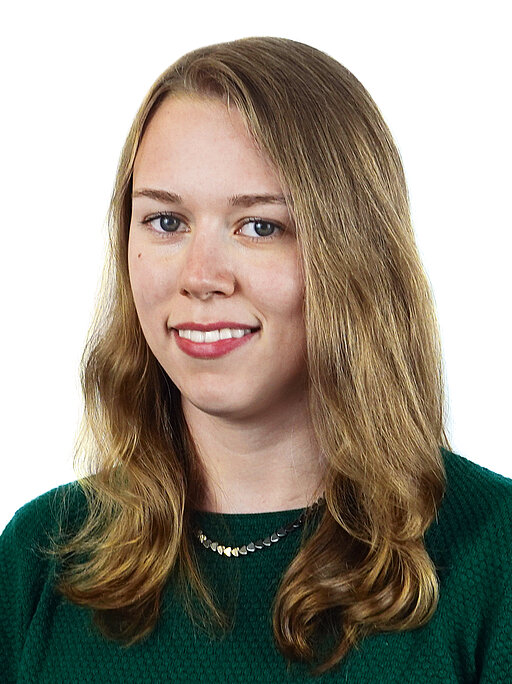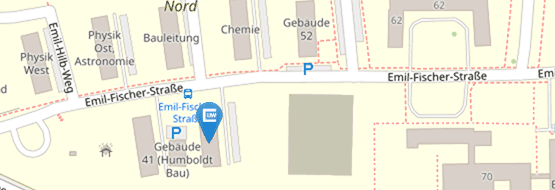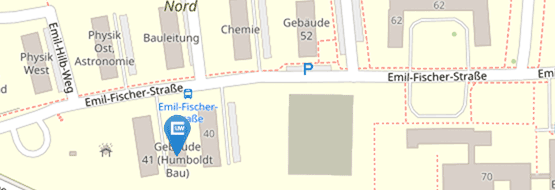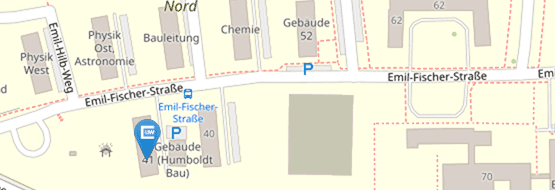Kathrin Hellmuth
Kathrin Hellmuth

Downloadable CV
- Kathrin Hellmuth, Christian Klingenberg, Qin Li
Preserving positivity of Gauss-Newton Hessian through random sampling
submitted (2024)
- Herbert Egger, Kathrin Hellmuth, Nora Philippi, Matthias Schlottbom
A kinetic chemotaxis model and its diffusion limit in slab geometry
accepted to Asymptotic Analysis (2025)
- Kathrin Hellmuth, Christian Klingenberg, Qin Li, Min Tang
Reconstructing the kinetic chemotaxis kernel using macroscopic data: Well-posedness and ill-posedness
SIAM Journal on Applied Mathematics, vol. 85, no. 2, pp. 613-635 (2025)
- Kathrin Hellmuth, Christian Klingenberg, Qin Li, Min Tang
Kinetic chemotaxis tumbling kernel determined from macroscopic quantities
SIAM Journal on Mathematical Analysis, vol. 56, no. 1, pp. 568-587 (2024)
- Kathrin Hellmuth, Christian Klingenberg
Computing Black Scholes with Uncertain Volatility—A Machine Learning Approach
Mathematics, vol. 10, no. 3, 489, special issue "Numerical Analysis with Applications in Machine Learning" (2022)
- Kathrin Hellmuth, Christian Klingenberg, Qin Li, Min Tang
Multiscale convergence of the inverse problem for chemotaxis in the Bayesian setting
Computation, vol. 9, no. 11, 119, special issue "Inverse Problems with Partial Data” (2021)
Conference proceedings:
- Kathrin Hellmuth, Christian Klingenberg, Qin Li
Multi-scale PDE inverse problem in bacterial movement
Hyperbolic Problems: Theory, Numerics, Applications. Volume II. HYP 2022. SEMA SIMAI Springer Series, vol 35 (2024), pp.395-405.
- Kathrin Hellmuth
Inverse problems for kinetic equations - an application to chemotaxis
Oberwolfach Reports. Rep. 18 (2021), no. 3, pp. 2316–2318
- Kathrin Hellmuth
An inverse problem for chemotaxis
Oberwolfach Reports. Rep. 18 (2021), no. 2, pp. 1080–1083
Science communication:
- Kathrin Hellmuth, Christian Klingenberg
Route planning for bacteria
Snapshots of modern mathematics from Oberwolfach (2022), no.12
Thesis:
- Kathrin Hellmuth (supervised by Christian Klingenberg)
On Qualitative Experimental Design for PDE Parameter Identification Inverse Problems (2025)
Various natural phenomena can be described using partial differential equations (PDEs). They often contain parameters that fit the general description of the phenomenon to a concrete situation. Reconstructing these parameters from experimental data is called the inverse problem and is necessary to fit the model and to enable prognosis.
I investigate such a parameter identification problem for a model of bacterial motion stimulated by a chemical signal (like a food source), which is called chemotaxis. It is often modelled by a kinetic chemotaxis equation in which a parameter encodes the bacterial reaction to the chemical signal. Supposing to be given velocity independent measurements of the bacteria density, photographies for instance, I study whether such data can contain enough information to recover the kinetic parameter. Furthermore, I study the relation between the reconstruction from the kinetic and a corresponding macroscopic Keller-Segel model.
| fall semester 2024/25 | Lecture Mathematics for Machine Learning (jjointly with Prof. Dr. Christian Klingenberg) |
| spring semester 2024 | Exercise class to Partial Differential Equations in mathematical Physics (with Prof. Dr. Christian Klingenberg) |
| fall semester 2023/24 | Exercise class to Mathematics for Machine Learning (with Prof. Dr. Christian Klingenberg) |
| fall semester 2022/23 | Exercise class to Mathematics for Machine Learning (with Prof. Dr. Christian Klingenberg) |
| fall semester 2021/22 | Exercise class to Partial Differential Equations in mathematical Physics (with Prof. Dr. Christian Klingenberg) |
| spring semester 2021 | Exercise class to Linear Algebra 1 (with Prof. Dr. Komla Domelevo) |
| fall semester 2020/21 | Exercise class to Linear Algebra 1 (with Prof. Dr. Sergey Dashkovskiy and Sandra Warnecke) |
| fall semester 2019/20 | Student Teaching Assistant in Analysis 1 (exercise class) JIM-Tutor |
| since Oct. 2020 | PhD studies, Institute of Mathematics, University of Wuerzburg, Germany Advisor: Prof. Dr. Christian Klingenberg |
| Apr. 2020 | M.Sc. in Mathematics, University of Wuerzburg, Germany Erasmus+ semester at the university of Padua, Italy, in summer 2018 Master thesis: Computing the Black Scholes equation with uncertain volatility using the stochastic Galerkin method and a Bi-Fidelity approach Advisor: Prof. Dr. Christian Klingenberg |
| Oct. 2017 | B.Sc. in Mathematics, University of Wuerzburg, Germany |





